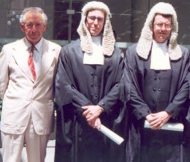8/18/2010
Australia: Appeals Court Rules Photo Ticket InadmissibleQueensland, Australia Court of Appeal tosses speed camera photo that was not properly authenticated.

California courts are not alone in questioning the validity of red light camera and speed camera photographs as valid legal evidence. On Friday, the Queensland, Australia Court of Appeal ruled that automated ticketing cases require more than a pair of images in a folder to make a speeding case that will stick. The motorist, a non-lawyer, won her case against the government with only the help of her husband.
A camera accused Bilyana LeKich of driving 114 km/h (70 MPH) in a 100 zone (62 MPH) on Bruce Highway in Burpengary on September 4, 2008. Lekich pleaded not guilty in Caboolture Magistrate's Court where a judge did little more than look at the photos and declare that she was guilty and must pay A$200. LeKich appealed to a district court which overturned this conviction on the grounds that the photos should not have been entered as evidence.
Under Australian law, the police commissioner must certify the photographs as "properly taken" at the time and location stated on the citation. The commissioner can delegate this power to another police officer, but the prosecution never offered any evidence that the power had been properly delegated -- other than the fact that a police officer's signature on the ticket was proof that the power had been delegated. The lower court judge did not buy the argument.
"The starting point, of course, for any criminal prosecution is that the evidence is to be given orally," the Brisbane District Court judge ruled last year. "Evidence in writing is prima facie hearsay and is inadmissible unless it comes within a statutory exception to the rule against hearsay.... There is certainly nothing in s. 120 of the act which permits the delegate to certify to the existence of the delegation where the commissioner's power has been delegated."
As hearsay, the photographs were inadmissible and Queensland Police Service was left with nothing to prove a case against LeKich. Court of Appeal Justice Hugh B. Fraser, writing for the three-judge panel, agreed with the district court findings because proper procedure is important when a signature constitutes automatic proof.
"The consequences of a delegation by the commissioner are by no means insignificant," Fraser wrote. "It arms a police officer with power to provide prima facie proof of an offense merely by signing a certificate which s. 120 otherwise requires to be signed by the commissioner. It does not seem unduly pedantic to insist upon proof of such a delegation where as the primary judge explained, the applicant [Queensland Police Service] could have taken advantage of the simple mode of proof which the legislature has provided."
A copy of the decision is available in a 150k PDF file at the source link below.


